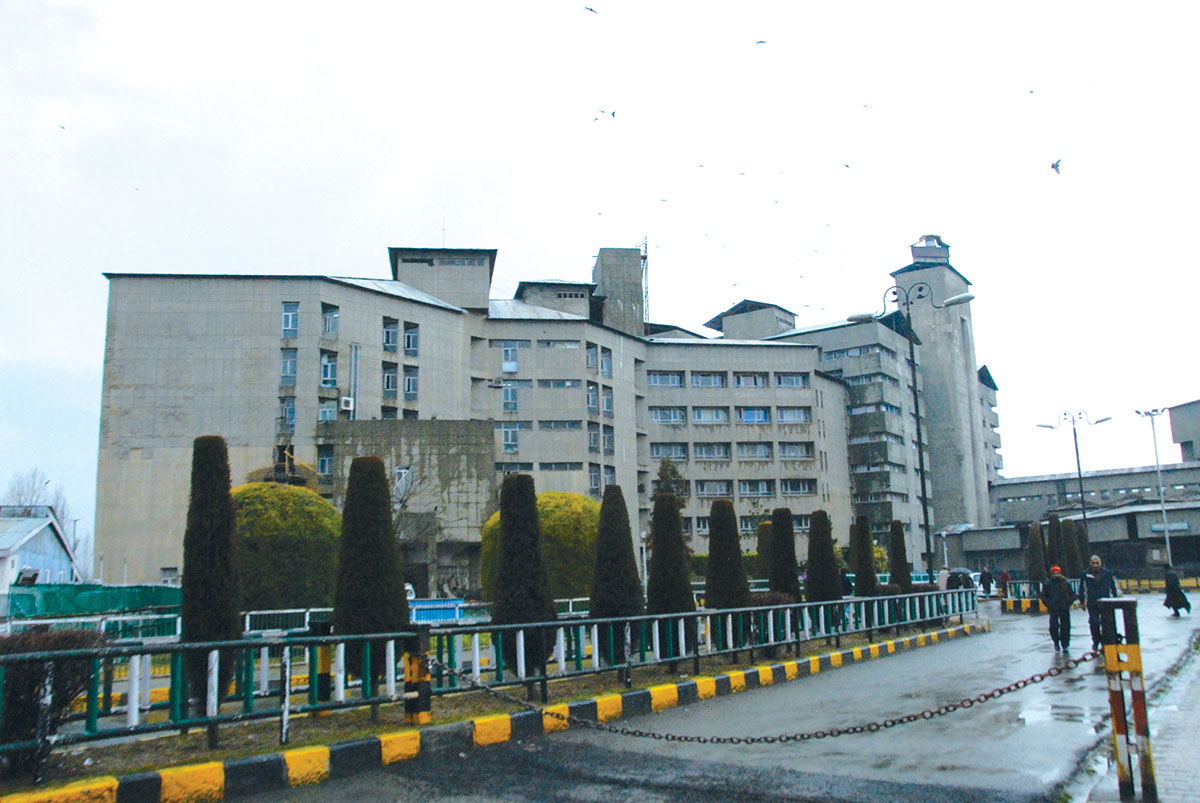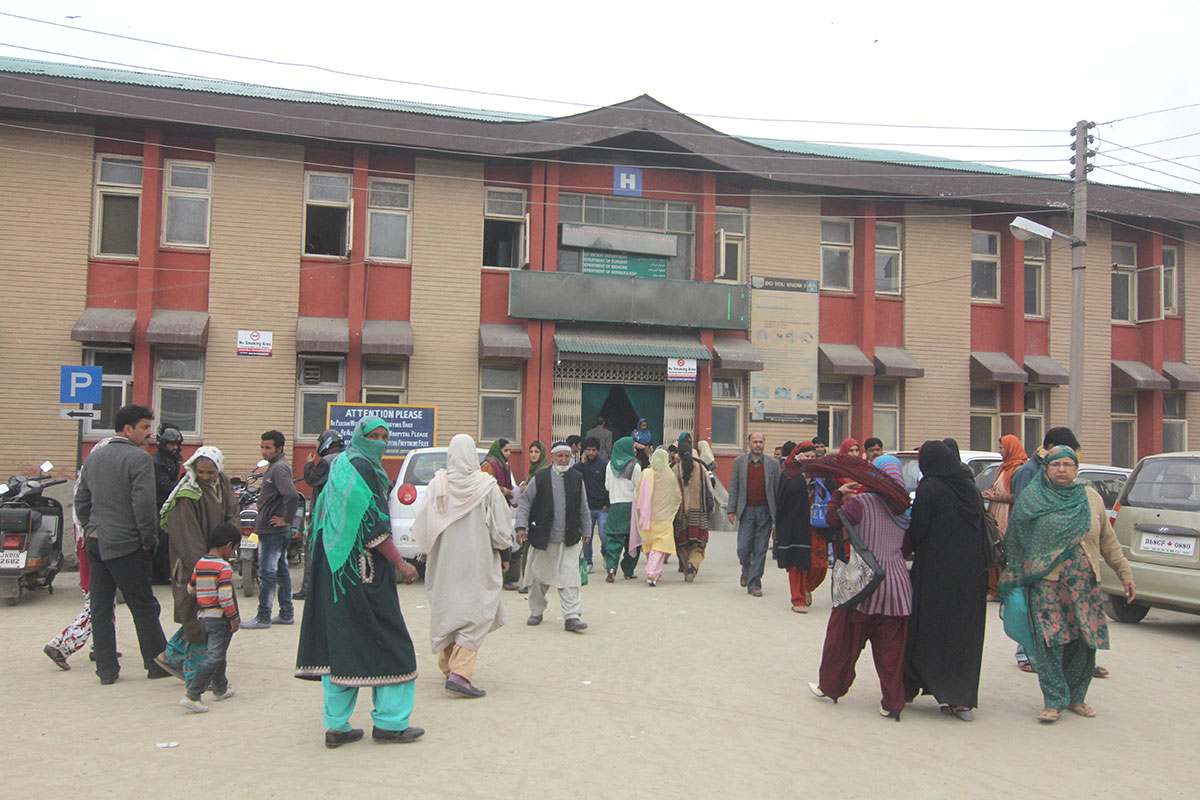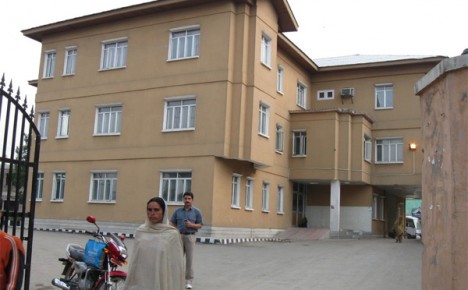The hospitals in a Kashmir are ill-equipped to handle the waste, especially bio-medical and radioactive, putting lives and the environment at risk. Ikhlaq Qadri reports.

The highly harmful waste generated by the hospitals is not disposed off properly for want of infrastructure and at times for the callousness of the people entrusted with the job.
Almost all government and private hospitals and laboratories have been found lacking in following set guidelines for disposing off the bio-medical waste in a research commissioned by the health department.
The research commissioned in 2009, under National Rural Health Mission, to know the overall condition of the healthcare system in the valley found the waste management in hospitals as inadequate and one of the waste management agencies ‘not fulfilling the requisite criteria and prescribed guidelines’.
The waste generated in hospitals, private nursing homes and laboratories is broadly of two types; solid and liquid; solid waste is further divided into ‘domestic’ and ‘infectious’ waste.
Apart from using their own waste disposal facilities the major hospitals used to outsource the waste management to two private establishments, Kashmir Health Care System, Lassipora and Clean City Waste Management, Lasjan. The licence of Lassipora plant has been suspended by the State Pollution Control Board (SPCB) and the case is now a court. The Lasjan plant, though functional, is awaiting the report of a Pollution Control Board inspection.
Hospital authorities claim, that the domestic waste is taken care of by the municipality, while the infectious waste is disposed off by the hospitals themselves.
However, the situation on the ground, the findings of the research and people associated with healthcare point to the unscientific and improper disposal of biomedical waste even in major hospitals of the valley.

SKIMS, Soura is the only tertiary care hospital in the Valley and it generates around 1500 Kilograms of waste in a day, including the refuse from its maternity hospital. The average waste generated per bed is around 2.5 Kg.
Medical Superintendent, SKIMS, Dr Syed Amin Tabish, says that the waste generated is composed of 85 per cent of domestic waste (non-infectious) and 15 per cent of bio-medical waste (infectious).
“We have our own system in place to dispose of the waste scientifically,” Dr Tabish added.
The institute has two incinerators, autoclaves and sewage treatment plant to dispose of bio-medical waste. Besides, there are garbage sheds, pits and also an open plot of land in front of Soura police station to dump the domestic waste.
“The syringes, sharps, pathological waste and laboratory waste are destroyed in the incinerator,” Dr Tabish said.
The hospital has three types of dustbins in each ward meant for on -source segregation of the waste generated in the hospital.
“Our nursing officers and senior residents go on surprise checks to make sure that things are done in a proper way (waste is segregated properly),” he said.

However, in Bohlach Pora, a locality adjacent to the hospital, hospital waste can be seen dumped in a plot, where rag pickers sift through garbage to collect items like plastic bottles, syringes, surgical and used drip-sets, most of which should have been sent to an incinerator.
The rag pickers, locals say, have taken land on rent and live in a tin shed built by the owner. The two rag picker families hailing from Calcutta have been into this business from the last fourteen years.
“Sahab ye to Kuch Nahi Hai, Hum gareeb log hai. Ek mahina huva hum ne ye kaam Chodh Diya (Sir this is nothing, we are poor people. We have quit this (collecting hospital waste) since a month,” said a woman who is in the business of collecting the scrap.
The women said that they would sell the refuse to a dealer, who exports it outside the state.
An elderly person walking by said, “This has become a nuisance for us. I cannot speak against it as the owner of the land is my neighbour.”
When the medical superintendent was informed about the waste being dumped at a private plot outside the hospital he was surprised and immediately ordered the assistant sanitation officer, Abdul Rashid to investigate it.
“This (the waste) is surely from the hospital but the sanitation staff is doing their duty. It is a lapse on the part of security who allow them to enter the premises,” Rashid said.
Few meters from the plot is the Beig Sarai, where patients from far off places get cheap accommodation. As most of the patients suffer from chronic diseases, the waste in the area presents a huge health risk for them.
The insiders denied the claims that waste is segregated completely or properly at the source.
“Nothing of that sort (waste segregation) happens inside. Neither patients nor the paramedical staff seems to care about what is to be thrown in which dustbin,” said an employee wishing not to be named.
But that is a matter of lack of awareness and sense of duty. “This is a matter of trust. One cannot accompany every staff member to see what he is doing,” Dr Tabish said.
The SKIMS incinerators are also used to do away with biomedical waste of SKIMS Bemina (formerly JVC) hospital, which produces around 325 kg of garbage every day.
“We have a complete system of segregation in place. The bio-medical waste is transported to SKIMS Soura to get it disposed off,” said Dr Nazir Ahmad, Medical Superintendent of the 232 bed SKIMS Bemina said.
However, a senior employee in the hospital said that the segregation and disposal of the biomedical waste is not done in a scientific way.

The 750-bed SMHS Hospital generates around 1500 kg of waste per day. The hospital until recently outsourced the waste management to a private agency. However, after the SPCB ban on the agency, the hospital restarted its own incinerator to dispose off the biomedical waste.
A senior doctor working in the hospital termed its waste disposal system as “mere eyewash”.
“This is just conversion of biological waste into chemical waste,” said a senior doctor, wishing not to be named.
The doctor equated the process of incineration with plain burning. “The way it should be carried out is not followed,” he said.
“They burn everything whatever comes in their way. Rest lies scattered near the park. If plastics are burned, they produce dioxins, furans, chloro phosphates which are carcinogenic and affect endocrine, metabolism and reproductive functions,” the doctor told to Kashmir Life.
The doctor detailed nine different categorises of waste which needed proper disposal: Human waste, animal waste, biotech waste, sharp waste, solid waste (contaminated), solid wastes like plastics, incineration ash, microbiological wastes.
As per the schedule, i and ii of bio-medical waste disposal rules chlorinated plastics shall not be incinerated.
The syringes used should ideally be destroyed immediately after use, in needle destroyer. But there are no needle destroyers available in the wards, the paramedical staff said. On average, about four hundred syringes are used in a day in the hospital casualty section.
Pointing towards the chimney of incinerator the doctor said, “You see the smoke coming out of the chimney. How black it is. The combustion is not taking place properly. The plant is run by the people who are not qualified to do so.”
The authorities at Srinagar Municipal Corporation, which is supposed to take care of the non-infectious domestic waste of the hospital are unhappy with the lack of proper segregation of hospital waste.
An employee at Srinagar Municipal Corporation’s dumping site said, “The hospital waste that reaches here is not segregated. We prefer to remain quiet and let the things happen as already we are having a tough time with the people of the locality.”
Many rag pickers were busy scavenging for plastics and other recyclables from the trash at the SMC’s Achen dump.
Health officer SMC, Dr Riyaz said that they had previously issued warnings to the hospital authorities for not ensuring proper segregation of hospital waste.
“Main enforcing agency is the pollution control board. We are playing our part as in past we have prosecuted them and imposed fine for not adhering to the rules. We have issued a warning to them for mixing bio-medical waste with garbage,” Dr Riyaz said.
The hospitals in the rural areas, even district hospitals, do not have a proper biomedical waste disposal system.

At the 100 bed Mirza Muhammad Afzal Beg district hospital Islamabad, officials say, around 250 kg of waste is generated per day. The hospital is having no proper mechanism to dispose off the waste and the sweepers take it to “unknown destination”.
“We don’t know where the waste handlers take it as there is no system to dispose of it properly,” said a hospital assistant.
The locals allege that the waste was previously dumped at the banks of the stream flowing adjacent to the hospital.
“The stream is no more now as they used to dump waste in that. God knows what they do it with now,” a local resident Raheel Yousuf told Kashmir Life.
In north Kashmir’s Baramulla district hospital, though there are different dustbins for segregation of waste at source, the practice is not followed. The 200-bed hospital produces around 400 kg of garbage per day and has an incinerator for disposing off bio-medical waste.
“There is no segregation of waste done at source,” said a hospital employee.
Hospital sources say the incinerator is to be used twice daily as it does not have the capacity to dispose off the bio-medical waste produced in the hospital in one go. But mostly, they said, it is used only once. The rest of the garbage finds its way into river Jehlum.
“The bandages are floating on the river, there are several layers of the hospital waste in the river,” said Abid, who resides in the locality of the hospital. In smaller sub-district hospitals and health centres, the waste is just dumped, anywhere they could. The 50-bed government Sub- District Hospital at Pattan generates around 75 kg of waste.
“The generated waste which also includes bio-medical waste is thrown in the backyard,” said a doctor, requesting not to be named.
Director health services is the head of almost all the government hospitals and health centres except SKIMS and associated hospitals of SMHS. The department outsources most of its waste management to the agencies approved by the government.
“We tie-up with the agencies approved by the pollution control board. Till recent past, we had a tie-up with two agencies, but now outsourcing to one agency has been kept on hold as the matter is in court,” said Director Health, Dr Amin Malik.
The director informed that they are trying to put up biomedical waste disposal system at the district level.
“We have submitted a proposal to the government for establishing a complete package of waste disposal system at the district level. The proposal is under active consideration,” Malik said.
Private hospitals, nursing homes and laboratories were either outsourcing their waste management or just dumped somewhere along with the garbage.
The owner of a renowned lab in Karan Nagar who requested not to be named said, “The pollution control board gave us direction to have a tie-up with the approved agency, we complied with the order. We don’t know what procedure they adopt to dispose of it (the biomedical waste) off”.
The State Pollution Control Board is the government agency entrusted with the job of enforcing guidelines for safe disposal of hospital waste. The SPCB has suspended the licence of Kashmir health care system Lassipora. The case is now in a court. “I cannot comment on it as it is the legal issue,” said Nazir Geelani, regional director SPCB.
The officer at SPCB did not talk about the reasons behind first issuing a licence then suspending it. “We had checked the facilities at the time of approval and then acting on the report of our district office we took action against the plant. Rest I cannot discuss as it (the case) is in the court,” said Dr Sabeena in charge bio-medical wastes in PCB.
The doctor said that as a temporary arrangement the laboratories which had a tie-up with Kashmir Health care system are disposing their waste to the nearby hospital which disposes it off along with their own waste.
“Labs nearby LD send their waste to the LD and the labs in Karan Nagar send their waste to the SMHS hospital,” Dr Sabeena said.
When the in-charge officer was asked about hospitals not following prescribed guidelines in disposing off the medical waste she said, “We will take action. You send your report with the evidence.”
Experts opine that the management of bio-medical waste should be prioritised and due care should be taken to minimise chances of spread of infectious diseases. “We should act fast to save society from the ill effects of mismanagement of bio-medical wastes. The institutions we work for should be there to eradicate diseases, not spread these,” said Dr Iqbal Mir.
Dr Saleem Khan of the Department of Social and Preventive Medicine at Government Medical College said, “All the stakeholders should understand their responsibility towards the community for a healthy environment. Otherwise, right from the waste generator, waste handler and the common man are at risk of getting HIV, Hepatitis B, and Hepatitis C through needle stick injuries.”
Under bio-medical waste rules 1998, there are set guidelines for bio-medical waste management and handling. Defaulters are liable to be prosecuted under section 5 and 15 of the environment (Protection) Act, 1986, which includes closure of the establishment, fine and imprisonment.















